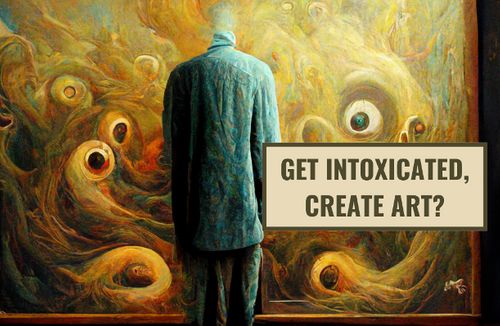How Art Comes From Intoxication
Oct 15, 2022 · 2 mins read
0
Share

Introduction. Nietzsche wrote that for humans to aesthetically perceive the world, and act artistically in it, they need to be intoxicated. This is the "physiological precondition." Nietzsche on the different types of intoxication, why there's no art for art's sake, and more 👇
Save
Share
Nietzsche: "Intoxication must first have heightened the excitability of the entire machine: no art results before that happens. All kinds of intoxication, however different their origin, have the power to do this: above all, the intoxication of sexual excitement."
Save
Share
Beyond the sexual desire, all "great desires" and all "strong emotions" inspire the artist within. Art comes from the "intoxication of feasting, of contest, of the brave deed, of victory, of all extreme agitation." Emotional storms & powerful urges make our perception aesthetic.
Save
Share
Here's how Nietzsche defines intoxication: "the feeling of plenitude and increased energy." One uses this excess energy and suffuses otherwise ordinary events and otherwise average people with MEANING, with STORY, and with PLEASING STRUCTURE.
Save
Share
Nietzsche: "In this condition one enriches everything out of one’s own abundance. The man in this condition transforms things until they mirror his power – until they are reflections of his perfection. This compulsion to transform into the perfect is – art."
Save
Share
If the artistic instinct is to honor, enhance, and beautify - what is the anti-artistic instinct? The opposite of the artist is the parasite. The artist makes everything he touches more, the parasite makes everything he touches less. Parasites take things and "impoverish them."
Save
Share
Both the Apollonian and Dionysian energies are "forms of intoxication." The Apollonian intoxication "alerts above all the eye" and makes the artist a visionary - think a sculptor or painter. The Dionysian intoxication allows the artist to transform - think the actor and dancer.
Save
Share
The architect is intoxicated by power: "Pride, victory over weight & gravity, the will to power, seek to render themselves visible in a building; architecture is a kind of rhetoric of power." The architect's creations are an intoxicated challenge to nature and time itself.
Save
Share
There's no such thing as "art for art's sake." All art seeks to "praise," "glorify," "select," and "highlight" something. Nietzsche: "By doing all this it strengthens or weakens certain valuations." The artists making "purposeless" art are still worshipping randomness and chaos.
Save
Share
For Schopenhauer, tragic art saps the will to life and disposes one to "resignation." For Nietzsche, tragic art reaffirms life - it says that existence is noble despite cruel fates and "great hardships." "Bravery and composure" remain possible, one can yet be a "heroic man."
Save
Share
0